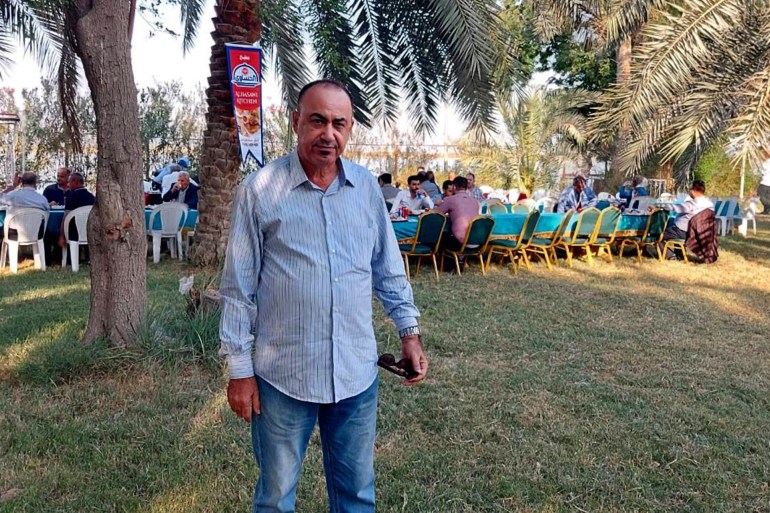Karbala -
The Iraqi novelist Ibrahim Sabti, in his novel "The Fox Palace", approaches the American power and compares it to the fox, to discuss the chaos and sectarian violence that followed the American invasion of the country in 2003, just as he discusses the adventure of alienation and immigration, and makes a central character in the novel an objective equivalent that represents The new Iraqi individual affected by all the variables.
The novel mentioned a well-known American actor, Clint Eastwood, who invites this character to visit his palace, so that the truth will be discovered there, just as disappointments and drowning in the continuous unknown of the Iraqi are revealed.
Sabti: The novel is realistic in a fantasy way, and it has invaded the worlds we know and we know (Al Jazeera)
The dream and the conditions of reality
Ibrahim Sebti, born in 1960 in the city of Nasiriyah, south of the Iraqi capital, Baghdad, and holder of a bachelor’s degree from the College of Education, has been published by novels: “Paradise of Equipment” in 2009, “Palm of the Stranger” in 2002, and “Safarjal” in 2017, in addition to To the novel "Descendant of Imagination" in 2021, and the novel "The Deposit" in 2022.
Sebti says about his novel that it talks about "Mohammed Al-Nasiri, the teacher who lives in a southern village, and dreams of going to the United States, through an invitation from the American actor Clint Eastwood, to imitate him the golden admirer's shield." to take him to America.
Cowboy movie icon Clint Eastwood, best cowboy movie actor of all time, awesome charisma, insight into fancy dress pic.twitter.com/zTnlyt2W4L
— Prince 👑 (@dy0pfenV6YXXa6j) March 17, 2022
But the detour occurs after arrival, as Eastwood discovers that Muhammad al-Nasiri is not the one who was intended, but rather his brother Ahmad, as they had correspondence and photos that spanned 20 years, and he knows that he has a mole (uncle), “where Muhammad al-Nasiri takes advantage of the killing of his brother by a car bomb explosion in his city, He pretends to be his character, taking advantage of the similarities between them."
The American star places two conditions in front of Al-Nasiri: either “to hand him over to the police as an illegal immigrant, or to work as a servant,” but he refuses the two conditions and thinks of escaping with the help of a Sudanese translator working in the American star’s palace, who erected a fox statue at his big gate, and plans to escape by hiding in a car Garbage takes him to a landfill, then he reaches the port and hides with an Egyptian young man who came in the same manner as Al-Nasiri to America.
And about his choice of the well-known American actor, he said, "He is the hero of the cowboy films, and he was considered a model for the American culture and dream that has always tickled the imagination of many people who lived under conditions of injustice, poverty and the confiscation of life in a country that has a lot of good."
Al-Kinani believes that the writer addressed the life reality through an unfamiliar vision (Al-Jazeera)
Reality fantasy
Critic Tariq Al-Kinani says that "the novel belongs to fantasy novels, as it is a true reflection of the writer's life experience in a series of events that passed through the country and came in the context of flashback," and believes that the writer addressed the life reality "from an unfamiliar vision that came within the context of the response of the American actor, where he discovers That the person who came is not the same fan who wrote to him.” The novelist made the death of the main character “an objective equivalent to the Iraqi reality with the deterioration of security in it, which was left by the invasion of Iraq.”
He believes that the same situation and in the manner of semantic displacement, "withdrew from the Egyptian character, who was also impressed by the same actor who invited her to honor, as he also assumed the personality of his brother," which means - according to Al-Kinani - that the novelist wanted to reflect "the rampant state of fraud and forgery in Our societies, he justifies it after that by several factors that he highlights in the novel.
There are stories of Sabti that have prepared plays and television works, including: “Faces in the Memory of Elly”, “Al-Tarid”, and “The Surprise of a Mountain”, and some of his productions have been turned into radio series, and some of his stories have been translated into English and German languages, and published as part of studies on the story. Modern Iraqi.
Hashem: The main thesis in the novel centers on human misery within society (Al-Jazeera)
Critic Aqil Hashem talks about the novel by saying that it "comes within what is termed in the critical narrative literature with the thesis novel, which, through a distinct and growing stylistic pattern, defends an idea or a human message."
Hashem believes that the movement in the novel "consecrates a pattern of argumentative discourse that seeks to disrupt intellectual structures, which emerge sharply from the danger of cultural rupture and sectarian wars, and destroy the pillars of civilization."
He asserts that "the basic thesis within this work revolves around human misery within society, in a social and psychological background that is closely related to the conditions of a society suffering from the effects of the invasion, where psychological and social rupture."
Concerning the narration style, the critic says that it is based “on the intriguing narration technique between the dream and the imagined reality, since the novel is based on an insidious recovery.”

